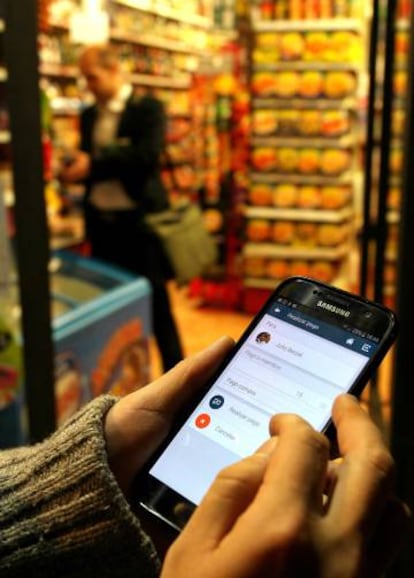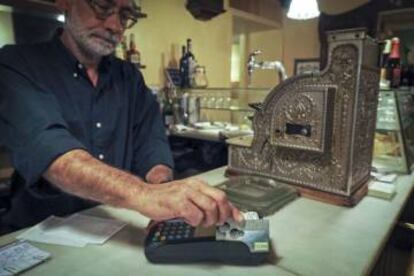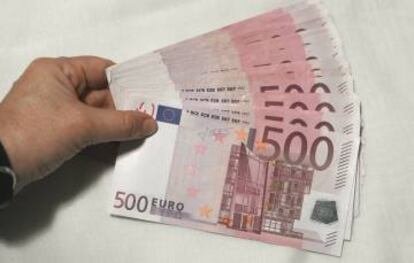Will you be paying for that in zoquitos or in txantxis?
Barcelona has made headlines with plans for a local currency, but Spain already has a wealth of them
Barcelona’s plans for a local currency have made the news this week, but the fact is that there are already dozens of alternative forms of payment in place all over Spain. The turuta, the res, the puma, the txantxi, the zoquito...these are just some of the community currencies being used to inject life in local economies everywhere, from Andalusia in the south to the Basque Country in the north.

“They are forms of payment created by individuals or groups in civil society, and managed democratically,” explains Miguel Yasuyuki Hirota, an expert on local currencies based at Valencia University.
Yasuyuki says there are 40 to 50 alternative currencies in place, all within very limited areas, and each with “between 2,000 and 5,000 users.” But some local authorities have more ambitious plans that include paying part of municipal workers’ salaries in the local currency.
The city of Barcelona has revealed that its own local currency, which will enter a pilot project phase in 2017 in the Besòs area, will reach 1,000 families.
Andalusia came first
The oldest functioning social currency in Spain will be 10 years old next year: the zoquito, used in Jerez de la Frontera (Cádiz). That is why the Andalusian city – otherwise famous for sherry wine and horses – will be in charge of organizing a national symposium next year.
“We are getting in touch with all the initiatives out there and organizing a program of events,” said Javier Saborido, one of the coordinators, who notes that the system is based on trust. “In the last five years, we had just a couple of cases of people who tried to take advantage of the system,” he says.
They are forms of payment created by individuals or groups in civil society, and managed democratically
Miguel Yasuyuki Hirota, Valencia University
Around 90 members of the zoquito network use the local currency to purchase “mostly organic food, but we also offer airport chauffering services, wedding books and clothing. Everyone can contribute something,” says Saborido.
Meanwhile, Andalusia's capital, Seville, has something called the puma, named after the neighborhood of El Pumarejo where it was created in 2012. It has 450 active users and the next step will be to digitalize the currency.
“We are working to implement the Clickcoin mobile app, which will give us greater control through statistics and accounting data,” says Noemí González, the project promoter, who says that the average user is a woman between 25 and 40 years of age, although some seniors have also joined the network.
Catalonia: turutas and res
Catalonia already has several alternative currencies. In the city of Vilanova i la Geltrú, around 350 people have been using turutas since 2010, spending them at 35 participating businesses.
The turutas are earned by doing farm work, tending community gardens, participating in social projects or carrying out other services. It is also possible to exchange euros for turutas through its Local Exchange Office and ethical bank. In 2014, city authorities lent their support to the project, adopting the turuta as the local currency of Vilanova i la Geltrú.
Ton Dalmau, co-founder of the turuta, says that the goal is “to advance towards food and energy self-sufficiency, towards a sustainable model.” In the face of global products, global markets and global currencies, he is a champion of “local products, local markets and local currencies.”
Meanwhile, the Catalan city of Girona has one of the largest local currencies in circulation anywhere in Spain. The res got off the ground in 2012 and already boasts 1,000 users and around 500 participating businesses, including bars, restaurants, hotels and all kinds of local stores. The nearby towns of Figueres and Olot also participate in the project.

But Catalonia’s most ambitious project of all is in Santa Coloma de Gramenet, which is putting the finishing touches on a local currency that will go into circulation in 2017. Mayor Núria Parlon says that, like the Bristol Pound, it will be “a local currency that channels public spending.”
Located in Barcelona’s metropolitan area, Santa Coloma has received a €132,028 grant from the EU to implement the alternative currency. In the first half of 2017, municipal workers may apply to receive up to 30% of their pay in the local currency. There are already 108 businesses on board the project, and 50 about to join.
The money does not have an official name yet, although people are calling it “parlones” after the mayor. “We want to improve the local economy and multiply public spending in the city,” says Parlon.
Basque ekhis and txantxis
The ekhi is the community currency in the Basque city of Bilbao. Once available in paper from, the ekhi has gone virtual. The project began in 2013 to encourage local, ethical and sustainable trade, with around 80 participating businesses and associations in Bilbao, Mungia and Basauri, all in the province of Bizkaia. During this period, there have been up to 7,000 ekhis in circulation and 30,000 transactions using them.
Now, ekhis have moved into an experimental, digital-only phase at 25 businesses until early 2017, when they will be offered to all users again. The mobile device-friendly system works like an e-wallet that can be recharged at participating establishments. Users also donate 0.5% of their average monthly balance to the charity of their choice.
Another experiment is underway in the Basque town of Oñati, in the province of Gipuzkoa. In order to attract users, there is a 5% discount on the euro price tag for items and services at participating establishments, which include hotels and restaurants.
Valencia: at the analysis stage
In recent months, Valencia has been studying the possibility of adopting a local currency in parts of the city, which has been run by a leftist coalition since 2015.
Valencia authorities are particularly interested in creating self-employment
Local authorities are particularly interested in the possibilities of creating self-employment in neighborhoods that have been hardest hit by unemployment. No specific areas or dates have been released yet.
Valencia Mayor Joan Ribó, of Compromís, ran on a platform that included the creation of a local currency to stimulate the local economy.
Madrid: citizens take the initiative
In Rivas, in Madrid’s metropolitan area, an association named Vaciarivas-Espacio Progresista wants to introduce the jarama, an electronic currency complementary to the euro and backed by it. It is expected to go into circulation in March 2017.
Besides stimulating the local economy, “establishments that include socially-conscious elements such as fitting rooms adapted for people with disabilities will get benefits when they exchange jaramas for euros, sort of like a discount,” says José Mayora, who thought up the project.

Local currencies are already a reality elsewhere in the Madrid region. In Alcalá de Henares, an association named Simbiosis launched the henar in November 2015.
“The goal is for people to understand what money is and how it is created,” says César Gallego, a member of Simbiosis. “We also want to foment new consumption alternatives. We seek business-to-business alliances and four or five users who will establish mutual business relations.”
Clara Blanchar (Barcelona), Pedro Gorospe (Bilbao), Ángeles Lucas (Sevilla), Mar Rocabert (Barcelona), Marta Rodríguez (Girona), Javier Salvatierra (Madrid), Amara Santos (Madrid) and Cristina Vázquez (Valencia) contributed reporting to this story.
English version by Susana Urra.
Tu suscripción se está usando en otro dispositivo
¿Quieres añadir otro usuario a tu suscripción?
Si continúas leyendo en este dispositivo, no se podrá leer en el otro.
FlechaTu suscripción se está usando en otro dispositivo y solo puedes acceder a EL PAÍS desde un dispositivo a la vez.
Si quieres compartir tu cuenta, cambia tu suscripción a la modalidad Premium, así podrás añadir otro usuario. Cada uno accederá con su propia cuenta de email, lo que os permitirá personalizar vuestra experiencia en EL PAÍS.
¿Tienes una suscripción de empresa? Accede aquí para contratar más cuentas.
En el caso de no saber quién está usando tu cuenta, te recomendamos cambiar tu contraseña aquí.
Si decides continuar compartiendo tu cuenta, este mensaje se mostrará en tu dispositivo y en el de la otra persona que está usando tu cuenta de forma indefinida, afectando a tu experiencia de lectura. Puedes consultar aquí los términos y condiciones de la suscripción digital.








































